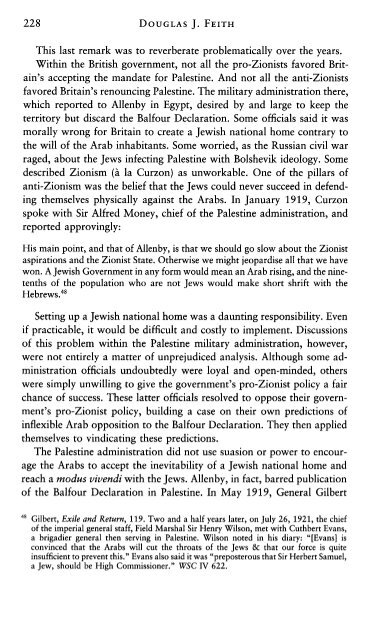Churchill, Palestine and Zionism, 1904-1922 - Douglas J. Feith
Churchill, Palestine and Zionism, 1904-1922 - Douglas J. Feith
Churchill, Palestine and Zionism, 1904-1922 - Douglas J. Feith
You also want an ePaper? Increase the reach of your titles
YUMPU automatically turns print PDFs into web optimized ePapers that Google loves.
228 DOUGLAS J. FEITH<br />
This last remark was to reverberate problematically over the years.<br />
Within the British government, not all the pro-Zionists favored Britain's<br />
accepting the m<strong>and</strong>ate for <strong>Palestine</strong>. And not all the anti-Zionists<br />
favored Britain's renouncing <strong>Palestine</strong>. The military administration there,<br />
which reported to Allenby in Egypt, desired by <strong>and</strong> large to keep the<br />
territory but discard the Balfour Declaration. Some officials said it was<br />
morally wrong for Britain to create a Jewish national home contrary to<br />
the will of the Arab inhabitants. Some worried, as the Russian civil war<br />
raged, about the Jews infecting <strong>Palestine</strong> with Bolshevik ideology. Some<br />
described <strong>Zionism</strong> (a la Curzon) as unworkable. One of the pillars of<br />
anti-<strong>Zionism</strong> was the belief that the Jews could never succeed in defending<br />
themselves physically against the Arabs. In January 1919, Curzon<br />
spoke with Sir Alfred Money, chief of the <strong>Palestine</strong> administration, <strong>and</strong><br />
reported approvingly:<br />
His main point, <strong>and</strong> that of Allenby, is that we should go slow about the Zionist<br />
aspirations <strong>and</strong> the Zionist State. Otherwise we might jeopardise all that we have<br />
won. A Jewish Government in any form would mean an Arab rising, <strong>and</strong> the ninetenths<br />
of the population who are not Jews would make short shrift with the<br />
Hebrews. 48 Hebrews. 48<br />
Setting up a Jewish national home was a daunting responsibility. Even<br />
if practicable, it would be difficult <strong>and</strong> costly to implement. Discussions<br />
of this problem within the <strong>Palestine</strong> military administration, however,<br />
were not entirely a matter of unprejudiced analysis. Although some administration<br />
officials undoubtedly were loyal <strong>and</strong> open-minded, others<br />
were simply unwilling to give the government's pro-Zionist policy a fair<br />
chance of success. These latter officials resolved to oppose their government's<br />
pro-Zionist policy, building a case on their own predictions of<br />
inflexible Arab opposition to the Balfour Declaration. They then applied<br />
themselves to vindicating these predictions.<br />
The <strong>Palestine</strong> administration did not use suasion or power to encourage<br />
the Arabs to accept the inevitability of a Jewish national home <strong>and</strong><br />
reach a modus vivendi with the Jews. Allenby, in fact, barred publication<br />
of the Balfour Declaration in <strong>Palestine</strong>. In May 1919, General Gilbert<br />
48 Gilbert, Exile <strong>and</strong> Return, 119. Two <strong>and</strong> a half years later, on July 26, 1921, the chief<br />
of the imperial general staff, Field Marshal Sir Henry Wilson, met with Cuthbert Evans,<br />
a brigadier general then serving in <strong>Palestine</strong>. Wilson noted in his diary: "[Evans) is<br />
convinced that the Arabs will cut the throats of the Jews & that our force is quite<br />
insufficient to prevent this." Evans also said it was "preposterous that Sir Herbert Samuel,<br />
a Jew, should be High Commissioner." WSC IV 622.


